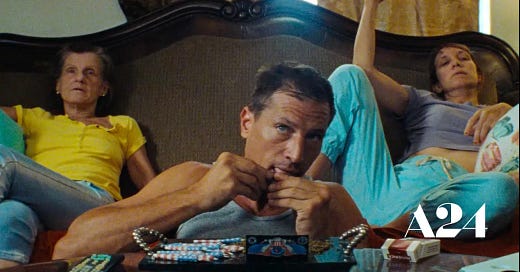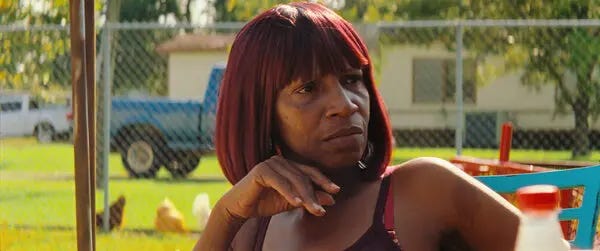In 'Red Rocket,' Exploitation, Sex, and Solidarity on the Texas Gulf Coast
Sean Baker’s third film in his “sex worker trilogy” captures American exploitation at work. Yet at the community level, it presents alternative economies of care.
Writer-director Sean Baker has ventured into the waters of unlikable characters with the archetype of disrespect: A very bad house guest. In Red Rocket, in theaters December 10, protagonist Mikey is responsible for many evils, but maybe the most irritating to his not-technically-ex-wife, Lexi, and her mother, Lil, is his refusal to do his own fucking dishes. “All the houses I’ve lived in in the past three years have had dishwashers,” he protests when confronted. Of course, that means the women of the house are left to do this labor. But as long as he helps out with rent—something he’s also shifty about, but pulls through—they’ll look past it.
Mikey is often making messes other people have to clean up. Out of work as an apparently once-successful porn star in LA, he takes a bus back to Texas City, his Gulf Coast hometown, with a black eye and not even a backpack to his name. (The circumstances under which he left are unclear.) After showing up at their doorstep, he charms his way back into Lexi and Lil’s home. It’s obvious from the beginning that he won’t be a good guest. Being a guest is all about give and take, gratitude in response to generosity, and, especially in a home characterized by scarcity, making a sincere attempt to give something back. How one responds to the gesture of sharing space can signify respect or lack thereof, and Mikey’s profound failure to return the favor captures something Baker has always been skilled at showing: How our relationships are economic, but not necessarily capitalistic. In a body of work all about economies, large and small, Red Rocket is an addition that presents two models of resource distribution in relationships: Exploitation and extraction versus mutual aid and support.
Sean Baker has called Red Rocket the last in his “sex worker trilogy,” preceded by The Florida Project (2017), and his breakthrough movie, Tangerine (2015). These two films follow sex workers in precarious situations: Two Black trans women working a block in LA, and a young white woman who lives on the verge of homelessness in a Florida motel. But Mikey occupies a different place in the industry—he’s a porn actor, but also a pimp. When he can’t get a job back in Texas City due to the stigma associated with sex work, his main hustle becomes grooming a 17-year-old girl who works at the donut shop down the highway. She hopes he can get her into porn and that she’ll be his ticket back to the good life in LA. It turns out he managed Lexi’s porn career, too, before an unseen conflict caused her to leave him and go back to Texas. Now, Lexi lives with her mom and works through Craigslist personal ads, something that worries Lil, concerned about how dangerous it is.
It’s strange to see Baker work on a film about Mikey, the bad apple of the bunch, but it’s a strong choice that shows a fuller picture of the industry. Only time will tell, but past acclaim suggests that sex worker fans trust him enough that he can experiment. Because he does so, Red Rocket becomes an absurd, hilarious, and provocative meditation on exploitation. All three of his most recent films are tragicomics portraying people living on the margins of society, and they always show exploitation sharply. Yet they also depict multiple economies pushing up against one another. Not only are the black market sex and drug trade at work in Texas City, just below the surface of the “real” economy, but non-sanctioned economies of care, driven by resource sharing and reciprocity, circulate just below the surface of exploitative relationships. In Tangerine, queer chosen families share resources, like rent money and wigs, during rough moments on the streets; in The Florida Project, kids in motel housing intuitively build relationships founded on equal distribution of goods and protecting one another.
In this way, Baker’s trilogy portrays “intimate economies,” to borrow from feminist and queer anthropologist Ara Wilson. Wilson studies “the political economy of intimacy,” or how patterns of everyday intimacy occur in relation to social power. Feminist and queer anthropologists have researched how global capitalism’s drive, particularly into the Global South, has changed the concept of economy in specific regions. Violent capitalist logics have imbued intimate relations in Texas since white settlers’ push there, primarily to expand chattel slavery and its sexual economies. On a day trip to Galveston Island, Mikey tells Strawberry, the chosen name of the 17-year-old girl he seduces and grooms, that a French pirate (Jean Lafitte) trafficked slaves, or “black ivory,” on this coast.
Visual metaphors of extraction, endemic to the region, are ever-present throughout Red Rocket. Oil refineries dot the frame, surrounding Mikey as if to say: Where’d you think he learned this? The Gulf Coast of Texas and Louisiana is the home to the largest concentration of petroleum refineries in the country. A middle-aged neighbor has died of bladder cancer as a result of the pollution. As it becomes increasingly clear that our main character is a capitalist making a mess for everyone else to clean up, he starts to mirror the industrial plants coughing toxic fumes and making everybody sick. When Trump starts to regularly appear on Fox News in the living room, placing us in 2016, it isn’t too hard to spot the parallels between Mikey and the exploiter-in-chief.
Within the intimate networks of the small town, Mikey’s capitalistic urges sow their own destruction. He starts selling drugs for Leondria, a Black elder in the community; she tells him not to sell to the refinery workers under any circumstances. Corporate security will fuck up their hustle. He does anyway. He flies close to the sun and constantly lies. At one point, Lil asks him to promise to stick around this time to protect Lexi, financially and physically. Mikey makes that promise but it doesn’t seem likely he’ll keep it. None of them have a car to get around, so he flatters the neighbor boy to the point where he gets free rides from him everywhere, eventually kicking him to the curb under tragic circumstances, too. There’s comedy to Mikey’s shtick: After incessantly blowing his own horn about his industry scenes, some of which won AVN Awards for “Best Head,” he winds up in multiple conversations being asked, “Wait, you won for receiving head? Didn’t the girl do all the work?” He insists the performance of receiving head is the real art.
Red Rocket is mostly about this mode: Cynical exploitation. It’s disturbing to watch Mikey’s predatory behavior with Strawberry, from manipulative interactions at her workplace to the early stages of their sexual relationship. We don’t get much of Strawberry’s inner life, and we never see what will actually happen to her if she goes to LA—an element that occasionally feels too vague. But it may be that we don’t need to see any more: As Mikey reveals how little he cares for Lexi, who in spite of herself, may love him, our hope diminishes that he sees either her or Strawberry as anything more than products to rotate.
In the most wrenching scene, one night Lexi works up the nerve to ask Mikey to come with her to her CPS hearing, where she’s fighting to get back custody of her son, fathered by another man, having lost her rights due to drug use. She’s clearly desperate, hoping she and Mikey can present stability, a repaired marriage, and the image of a nuclear family. Mikey doesn’t even look at her, facing the other way at the edge of the bed, and after a moment of silence, just yells at her. “Where the fuck is his dad, anyway? Why doesn’t he do it?” He then storms out of the room. Lexi looks like she could scream, or cry, but is too tired, and lights a cigarette instead.
It is Red Rocket’s climactic scene—spoilers to come—that articulates an undercurrent of socialist, anarchist, and feminist vision. In what feels like the village striking back, Leondria, an old friend of Lil’s, sends her three grown kids over to the house to kick Mikey out. They and Lexi wake him up, asleep butt naked, and hurl insults for minutes. “It’s time for you to go, bitch!” It’s a wild sequence of classic Sean Baker farce, with the same chaos as the donut shop climax of Tangerine. Yet despite its silliness it demonstrates a sort of solidarity and accountability, or at least Southern hometown loyalty. These working-class women take care of one another. Mikey escapes out the window, still naked, and runs to Leondria to demand his money, his dick swinging in motion. She has no sympathy, and tells him, “You are a persona non grata. ... Get out of Texas.” Bad guests, guests with no respect, and who steal, aren’t welcome. Leondria is a matriarch and a businesswoman, at the top of a certain ladder, but her concept of economy, of reciprocity in her long-term friendship with Lil, seems to look more like a web of resources than a hierarchy of extraction. She respects her kids’ labor, and they all share its fruits. But they also just fuck up Mikey for fun. In some ways, taking him down a notch feels futile, like swimming upstream. He’ll probably still go ahead ruining young women’s lives and get away with it. Yet Lil, Lexi, Leondria, and her daughter June demonstrate a form of intimacy that Mikey has no access to: They share trust, an economic analysis generated by emotional investment and support, that this man, who only knows how to exploit, could never offer.









Amazing Nicky